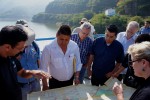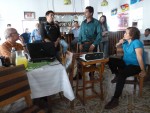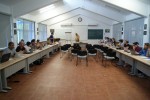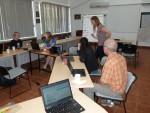Scientists from the Mexico and U.S. Long Term Ecological Research (LTER) networks are engaged in an effort to establish a research platform to better understand water resource issues at LTER sites in these two countries. As part of this effort, 15 scientists and students from each network attended a workshop held at the Chamela Field Station, Jalisco, Mexico in October 2012 to discuss issues of local water sustainability in a socio-ecological context.The U.S. LTER was represented at the meeting by scientists from Luquillo (Bill McDowell, Lauren Koenig, Fred Scatena, Alonso Ramírez), Central Arizona-Phoenix (Chuck Redman, Dan Childers, Nancy Grimm, Agustín Robles-Morua), Florida Coastal Everglades (Tiffany Troxler, Chris Madden, Rene Price, Edgar Espinoza), Coweeta (Cathy Pringle), and Sevilleta (Kristin Vanderbilt). These sites are biophysically similar to sites represented within the Mexico LTER network (http://www.mexlter.org.mx/en/Main), including Chamela (Manuel Maass, Catherine Mathuriau, Adriana Flores, Alicia Castillo, Elena Lazos, Marisa Mazari, Jazmin Solis Carpio), Gracilis (Jésus Meraz), Mapimi (Victor Reyes, Víctor Diego Quiñonez Quintana), Ecopey (Victor Rivera Monroy, David Valdés, Sara Morales), and Manantlan (Luis Manuel Martinez Rivera, Demetrio Meza Rodriguez).
Participants were tasked with brainstorming research questions and empirical approaches that address water sustainability, the balance between conflicting ecosystem services (water for people vs. water for the environment), and the vulnerability and resilience of socio-ecosystems in the face of social and climatic changes.
The U.S. LTER participants were treated to several field excursions during which the group had the opportunity to interact with local water managers and stakeholders. At the Trigomil Dam on the Ayuquila River, the dam engineer spoke about the challenges of providing water to multiple stakeholders, including the sugarcane industry, small-scale farmers and municipalities. During a visit to the town of Villa de Purificación, water managers discussed the effects of and local response to contamination of surface and groundwater. The municipal manager of a small village outside Chamela, Jalisco, Mexico, highlighted the resourcefulness and efficiency of local water management but expressed concern about external pressures, including tourism development and climate change.
Synthesis and comparison of site-level data and lessons learned from these stakeholder visits point to opportunities for continental ecohydrological research involving Mexican and U.S. LTER sites that represent a diversity of social structures and biophysical structures.
The collaborative group of Mexican and U.S. LTER scientists intend to continue this work through a proposal to the Water, Sustainability and Climate program at the National Science Foundation (NSF) and a research paper comparing social and biophysical parameters across participating LTER sites.
The Mexico and U.S. LTER Networks are both members of the International LTER Network, which promotes collaboration between its 40 member country networks to address broad-scale ecological and socio-economic research questions. The partnership between Mexican and U.S. networks presents an opportunity for scientists and graduate students from both countries to gain an understanding of how different local policies and cultures affect how water is perceived and managed. Scientists from both sides of the border can benefit from collaboration by extending the scope of their studies to include new ecological and social systems.
The U.S. LTER participants thank NSF for providing a “Catalyzing New International Collaborations” grant to Bill McDowell that enabled the meeting, and their Mexican hosts for the warm hospitality and engaging collaboration.
By Lauren Koenig (LUQ) & Kristin Vanderbilt (SEV)

 Enlarge this image
Enlarge this image


